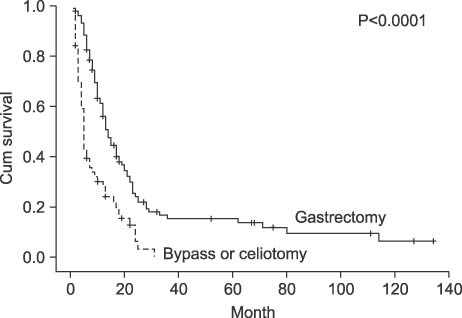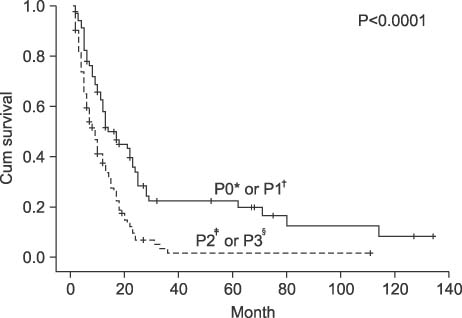J Korean Surg Soc.
2011 Jan;80(1):16-22. 10.4174/jkss.2011.80.1.16.
Prognostic Factors for Gastric Cancer Patients with Synchronous Metastasis
- Affiliations
-
- 1Department of Surgery, College of Medicine, Hanyang University, Seoul, Korea. sjkwon@hanyang.ac.kr
- KMID: 2096614
- DOI: http://doi.org/10.4174/jkss.2011.80.1.16
Abstract
- PURPOSE
The prognosis for gastric cancer patients with distant metastasis is very poor. The purpose of this study was to evaluate the prognosis and survival for gastric cancer patients with synchronous metastasis.
METHODS
Among 2,083 gastric cancer patients who received surgery at the Department of Surgery, Hanyang University Hospital from 1992 to 2009, 164 patients revealed distant metastasis. However, 3 patients who died of postoperative complications were excluded. For the remaining patients, various clinicopathological factors were analyzed using univariate and multivariate survival analyses.
RESULTS
Systemic chemotherapy (SC), type of surgery, lymph node dissection, degree of peritoneal carcinomatosis (PC), presence of ascites and tumor location were significant prognostic factors. However, sex, age, number of metastatic sites and histologic classification were not significant prognostic factors. In multivariate analysis, the type of surgery, the SC and the degree of PC were independent prognostic factors. Survival benefit by SC was significant in single site metastasis. The significant survival difference between resection and non-resection groups was observed regardless of number of metastatic sites.
CONCLUSION
In gastric cancer patients with metastasis, the favorable prognostic factors were type of surgery and SC in single metastasis. The gastrectomy improves the prognosis regardless of number of metastatic sites. However, a prospective randomized clinical trial is mandatory to attain more accurate information.
Keyword
MeSH Terms
Figure
Reference
-
1. Cheung LY, Delcore R. Townsend CM, editor. Gastric cancer. Sabiston Textbook of Surgery. 2001. 16th ed. Philadelphia: W.B. Saunders;855–865.2. Jemal A, Tiwari RC, Murray T, Ghafoor A, Samuels A, Ward E, et al. Cancer statistics 2004. CA Cancer J Clin. 2004. 54:8–29.3. Annual Report on the Cause of Death Statistics (Based on Vital Registration). 2000. Seoul: National Statistical Office.4. Central Cancer Registry in Korea. Annual Report of the Central Cancer Registry in Korea. 2000. Seoul: Ministry of Health and Welfare.5. Park JH, Kim DG, Jung SS, Woo SJ, Lee MD, Kim SK, et al. Clinical analysis of gastric adenocarcinoma experienced during recent 10 years and follow up results. J Korean Surg Soc. 1992. 42:787–798.6. Suh KW, Kim CB, Kim MW, Chi HS, Cho CH, Kim BR, et al. A clinical Study of 2789 gastric cancers. J Korean Surg Soc. 1991. 41:148–158.7. Saidi RF, ReMine SG, Dudrick PS, Hanna NN. Is there a role for palliative gastrectomy in patients with stage IV gastric cancer? World J Surg. 2006. 30:21–27.8. Okuyama K, Isono K, Juan IK, Onoda S, Ochiai T, Yamamoto Y, et al. Evaluation of treatment for gastric cancer with liver metastasis. Cancer. 1985. 55:2498–2505.9. Japanese Research society for Gastric cancer. Japanese Classification of Gastric Carcinoma. 1995. 1st English edition. Tokyo: Kanehara & Co., Ltd..10. Sobin L, Gospodarowicz M, Wittekind C. International Union Against Cancer (UICC). TNM Classification of Malignant Tumours. 2009. 7th ed. New York: Wiley.11. Fujisaki S, Tomita R, Nezu T, Kimizuka K, Park E, Fukuzawa M, et al. Prognostic studies on gastric cancer with concomitant liver metastases. Hepatogastroenterology. 2001. 48:892–894.12. Takahashi N, Hirai K, Ohtsuka A, Takahashi M, Kimura A, Toshida S, et al. Evaluation of surgical treatment for stage IV gastric cancer. J Jpn Surg Soc. 1986. 87:1201–1205.13. Korenaga D, TsuJitani S, Haraguchi M, Okamura T, Tamasa R, Sugimachi K. Long term survival in Japanese patients with far advanced carcinoma of the stomach. World J Surg. 1988. 12:236–241.14. Maehara Y, Kakeji Y, Takahashi I, Okiyama T, Baba H, Anai H. Noncurative resection for advanced gastric cancer. J Surg Oncol. 1992. 51:221–225.15. Kunisaki C, Shimada H, Akiyama H, Nomura M, Matsuda G, Ono H. Survival benefit of palliative gastrectomy in advanced incurable gastric cancer. Anticancer Res. 2003. 23(2C):1853–1858.16. Kunisaki C, Makino H, Takagawa R, Oshima T, Nagano Y, Fujii S, et al. Impact of palliative gastrectomy in patients with incurable advanced gastric cancer. Anticancer Res. 2008. 28(2B):1309–1315.17. Lin SZ, Tong HF, You T, Yu YJ, Wu WJ, Chen C, et al. Palliative gastrectomy and chemotherapy for stage IV gastric cancer. J Cancer Res Clin Oncol. 2008. 134:187–192.18. Makino H, Kunisaki C, Izumisawa Y, Tokuhisa M, Oshima T, Nagano Y, et al. Indication for hepatic resection in the treatment of liver metastasis from gastric cancer. Anticancer Res. 2010. 30:2367–2376.19. Koga R, Yamamoto J, Ohyama S, Saiura A, Seki M, Seto Y, et al. Liver resection for metastatic gastric cancer: experience with 42 patients including eight long-term survivors. Jpn J Clin Oncol. 2007. 37:836–842.20. Yagi Y, Seshimo A, Kameoka S. Prognostic factors in stage IV gastric cancer: univariate and multivariate analyses. Gastric Cancer. 2000. 3:71–80.21. Monson JR, Donohue JH, McIlrath DC, Farnell MB, Ilstrup DM. Total gastrectomy for advanced cancer. A worthwhile palliative procedure. Cancer. 1991. 68:1863–1868.22. McCarter MD, Fong Y. Role for surgical cytoreduction in multimodality treatments for cancer. Ann Surg Oncol. 2001. 8:38–43.23. Hartgrink HH, Putter H, Klein Kranenbarg E, Bonenkamp JJ, van de Velde CJ. Value of palliative resection in gastric cancer. Br J Surg. 2002. 89:1438–1443.24. Pollock RE, Roth JA. Cancer-induced immunosuppression: implication for therapy? Semin Surg Oncol. 1989. 5:414–419.25. Yagi Y, Seshimo A, Kameoka S. Prognostic factors in stage IV gastric cancer: univariate analysis. Gastric Cancer. 2000. 3:71–80.26. Sasako M, Sano T, Yamamoto S, Kurokawa Y, Nashimoto A, Kurita A, et al. D2 lymphadenectomy alone or with para-aortic nodal dissection for gastric cancer. N Engl J Med. 2008. 359:453–462.27. Yonemura Y, Wu CC, Fukushima N, Honda I, Bandou E, Kawamura T, et al. Operative morbidity and mortality after D2 and D4 extended dissection for advanced gastric cancer: a prospective randomized trial conducted by Asian surgeons. Hepatogastroenterology. 2006. 53:389–394.28. Yao JC, Ajani JA. Adjuvant and preoperative chemotherapy for gastric cancer. Curr Oncol Rep. 2002. 4:222–228.29. Emoto T, Yoshikawa K, Fujikawa M, Fjii M, Yoshioka Y, Hamada E. [A case of gastric cancer with multiple liver metastasis responding to TS-1]. Gan To Kagaku Ryoho. 2002. 29:771–775.30. Noh SH, Yoo CH, Chung HC, Roh JK, Shin DW, Min JS. Early postoperative intraperitoneal chemotherapy with mitomycin C, 5-fluorouracil and cisplatin for advanced gastric cancer. Oncology. 2001. 60:24–30.
- Full Text Links
- Actions
-
Cited
- CITED
-
- Close
- Share
- Similar articles
-
- Characteristics of Synchronous Cancers in Gastric Cancer Patients
- Prognosis and Treatment Outcomes of Gastric Cancer Patients with Hepatic Metastasis
- Early Gastric Mucosal Cancer Associated with Synchronous Liver Metastasis
- A Case of Synchronous Double Early Gastric Cancer Lasting for 10 Years in Elderly Patient
- Clinicopathologic Features and Difference in Prognosis in Synchronous and Metachronous Hepatic Metastases of Gastric Cancer




